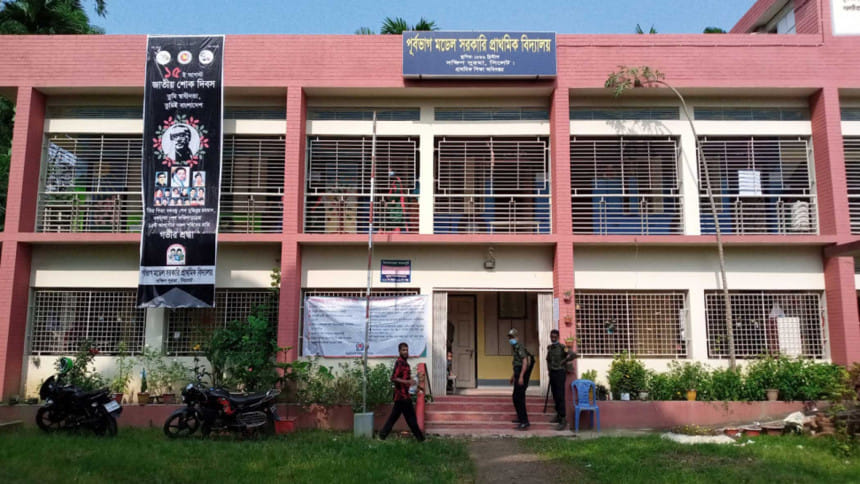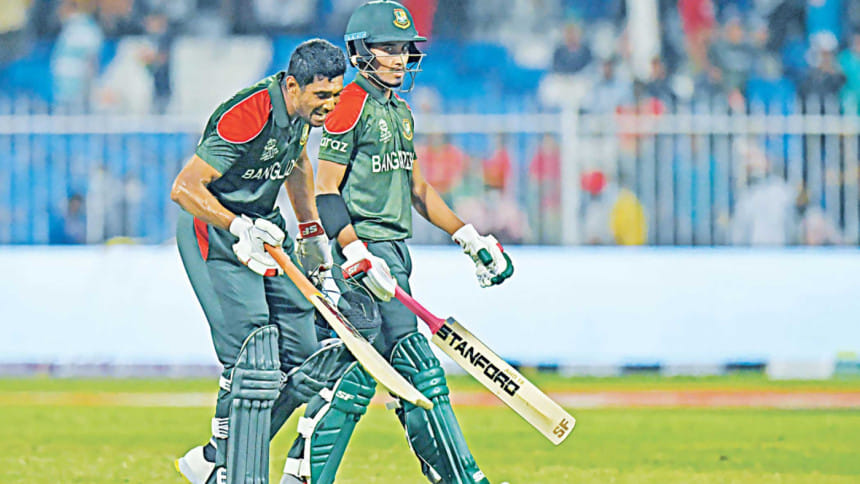Column by Mahfuz Anam: Our team at T20 World Cup - A metaphor of present-day Bangladesh politics

At the very start, I say with as much vehemence as I am capable of that a game is a game is a game. Every tournament should be a contest of the exceptional and the best sports person should win, and we would all celebrate their excellence. It is primarily meant for the players who, through a lifetime of passion and commitment, training and sacrifice at a personal level, would endeavour to fulfil his or her dream of being the best in their favourite sport. In the process, we see some awe-striking quality sporting events.
But as nationalism crept in, sport became weaponised to bring "pride" for the nation and the players themselves got swayed into it, as they enjoyed the national adulation that resulted from it. It reached its tragic peak during the superpower rivalry, which was a contest not only between two countries—which is bad enough for sports as it is—but was also one between two ideologies. At the height of the Cold War, in addition to Soviet Union's sporting victories, successes of Eastern European communist countries were all proclaimed as the success of the socialist system, along with its ideological and related regimentation.

Ideological thrust may have gone, but sports as a part of nationalistic image building is alive and well and more powerful and, at the same time, harmful as it is fed by life-threatening doses of "hate-steroid" through the ever-expanding presence of social media. The "public" treatment of Indian bowler Mohammed Shami and Bangladeshi batsman Liton Das and the abuses they had to suffer for their performance is far beyond nationalism and ideology. Racism has been sport's old malaise. Now a new and a more insidious one has been added—misinterpreted religion, whose hateful misuse, from which the Indian subcontinent has been suffering for decades if not centuries, has returned with all its perniciousness. It's so very sad for sports, for the fans, for the spectators, and devastating for the players.
However, the malaise in sports and religion-based attack on our players—very important topics on their own—are not the focus of my column today. Bangladesh in T20 World Cup as a metaphor of our present-day politics is.
Instead of strengthening our players' ability to win matches under any conditions, we tamper with the pitch. Instead of winning the voters' support through public service, we tamper with the election. Instead of telling the truth about the actual level(s) where our players really are, we create a false narrative by "winning" against Australia and New Zealand, and thus give a false sense of confidence to them which gets shattered the moment we face the rigours of the international standard. Instead of preparing our own parties to face the reality of public opinion, we stop the expression of public opinion itself, with intimidation, violence and unjust laws.
Everybody knew—at least the journalists did and they wrote about it ceaselessly—about the folly of making our players go through the preparatory matches on low bouncing, spin supporting and generally slow pitches. This was in direct contrast to the hard-hitting fast pitches of the host countries where the World Cup is being played. Yet we opted for such a pitch only to be able to say that we defeated Australia and New Zealand. These results, the leaders of our cricket board thought, would give such a boost to the confidence of our players and would so strengthen their morale that we would have a sterling performance ahead of us.
The only problem was that it was based on falsehood. The results were contrived. The so-called well-planned preparation was actually a well-planned disaster. It brought us shame instead of pride, it destroyed whatever confidence the sports-mad and team-adulating Bangladeshi fans had in our team. Worst of all, it broke the very backbone of self-assuredness that a player needs to face his very first ball in front of a huge crowd and a far bigger TV audience.
Our team's performance in the latest T20 World Cup makes for such a striking metaphor of our politics that no one but sycophants will miss it. For the last 30 years—save two, though a large part of those two years were spent in preparation for the election of 2008, which brought the present ruling party in power with a thumping majority of its own—we have been practising democracy. But what have we to show for it?
Over the years our elections have gotten more and more contrived. They have shifted from the hand of the voters to those of election officials, the police, the intelligence bodies, the bureaucracy and local musclemen.
The Election Commission, such a prestigious body in most democracies—Trump would triumph many times over under one like ours—has made a laughing stock of itself. No amount of public disillusionment has had the slightest impact on our election authorities to prod them to inquire into the quality of the elections that they hold. Is election just some massive logistical undertaking? What about public faith in them? Shouldn't they have done some survey as to what voters think about their performance? If they have done any, we would be happy to know the outcome. The fact that election disputes take years to be resolved and sometimes even overshoots the tenure of disputed election never prompted them to reform.
There is nothing in our system called voters' education. This is something that the Election Commission should undertake throughout the year, teaching people about their rights and, not to forget, obligations in a democracy.
Right now, local government elections are going on and what we see is the violence and the corruption. Have we heard anything about empowering the local government bodies, decentralising power from Dhaka, relaxing somewhat the strangulating bureaucratic hold over the local bodies? There has been virtually no devolution of power in the real sense. All the local bodies—union parishad, upazila parishad, zilla parishad—consist of elected people's representatives. But they all work under the supervision of the Local Government Division of the relevant ministry who have the power to fire them. A case of bureaucrats having the last say over elected people's representatives.
A fundamental institution of democracy is the parliament. Ours have the dubious honour of not having debated any significant issue facing the country. If the Covid pandemic and climate disaster couldn't have been considered by our parliament as worthy of special sessions or even just debates, then what would move their hearts and minds is a question far beyond my ability to answer.
Similarly, in our T20 World Cup preparation we fix our pitch so that outside teams cannot play, train our bowlers to suit the pitch and win matches and declare we are ready for the world, and lose the very first match against a team whom we should have beaten. Did the team play badly? Yes, but they were a disabled team to start with—disabled by those who forced them into wrong preparation, false hope and a make-believe journey that was never there.
So also in our democratic journey, we hold elections in which the deeper truth than what the results reveal is known to all. Because the truth is also known to those who wear the garlands of "victory", they lack the confidence to speak the truth, and because they don't speak the truth, a make-believe world of victory and self-righteousness is created which leads to more make-belief and greater self-righteousness, and so the cycle of mischief continues to spin in its downward spiral.
I am told that all teams tamper a bit with the home pitches. So, what if we over did it? Well, we know what happens when we do so. Will the lessons from cricket have any good influence on our politics? In cricket there are international matches that tell us that we are on the wrong path. In politics, the only self-correcting mechanism is the elections. If we have done away with it in everything but name, then that correction prospect is non-existent for us.
Mahfuz Anam is the editor and publisher of The Daily Star.

 For all latest news, follow The Daily Star's Google News channel.
For all latest news, follow The Daily Star's Google News channel. 



Comments